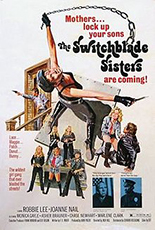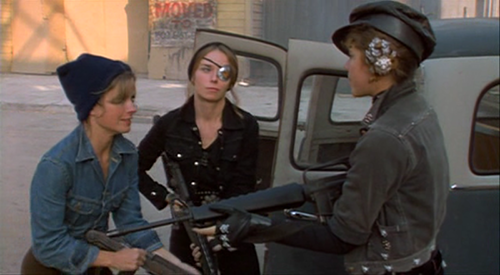
 I had the ultimate pleasure to meet director Jack Hill in the early 2000s, when he was a at a local college campus showing a double feature that included Switchblade Sisters, a film that gained new prominence once Quentin Tarantino’s Rolling Thunder Pictures reissued it to theaters.
I had the ultimate pleasure to meet director Jack Hill in the early 2000s, when he was a at a local college campus showing a double feature that included Switchblade Sisters, a film that gained new prominence once Quentin Tarantino’s Rolling Thunder Pictures reissued it to theaters.
One of my favorite films since a rental in the early ’90s from a now long-gone video store in Oklahoma City, it was thrilling to see it on the (somewhat) big screen and even more thrilling to meet the soft-spoken man who made it, a film that he described as a modern (as modern as the ’70s can be, I suppose) take on Othello.
Switchblade Sisters tells the story of blonde Maggie (Joanne Nail, in short shorts and high-heeled boots), a streetwise teenager who, after a scuffle in a local burger bar, ends up in a girl gang called the Dagger Debs, led by Lace (Robbie Lee, who has always reminded me of a Depression-era youth). When her boyfriend, the leader of the Silver Daggers, dies, they become the Jezebels, the meanest bunch of teen troublemakers in town.
However, when high school sleaze Crabs (Chase Newhart, channeling his evil Eaglebauer) tries to take full control, the Jezebels team up with a Black militant squad led by Muff (Marlene Clark, who really should have had a spin-off flick) and take the dirty motherfucker and his boys down, by any means necessary, which, thankfully, includes plenty of machine guns.
A box-office dud upon release, Switchblade Sisters effectively killed Hill’s career, but, even watching it now, the amount of guts on display here proves that he was far ahead of his time, delivering a movie that would probably make at least good money at Redbox, capitalizing on all the things that have made movies in general great over the years: rowdy girl gangs, dark violence, black humor, Black nationalism and, I guess, Shakespeare.
Well, at least all the things I love in a movie. —Louis Fowler

